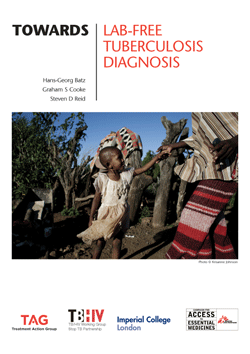A strategic vision for R&D into point-of-care testing in resource-poor settings
Tuberculosis (TB) remains a major challenge to public health globally, particularly in resource-poor settings.
August 2011 – Although most cases of TB are curable, tuberculosis causes around 2 million deaths each year, in part due to late or missed diagnosis. The control and ultimate elimination of this disease, therefore, still rests on prompt diagnosis and therapeutic intervention to reduce ongoing transmission. Improving the performance of diagnostics and their availability is therefore key to reducing global morbidity and mortality from TB and thus achieving the Millennium Development Goals.
Despite some progress in recent years, simple diagnostics for community-based diagnosis of TB in resource-poor settings are lacking, and funding remains inadequate. Whilst HIV diagnosis has been greatly assisted by the development of robust point-of-care (POC) or lab-free diagnostics suitable for field use, the diagnosis of TB remains clinically challenging and logistically difficult in resource-poor settings. The limitations of existing diagnostics result in diagnostic delays that contribute to late or missed diagnoses, with serious consequences for disease progression and TB transmission, thus fueling the epidemic. Delayed diagnosis is also often the cause of loss to follow-up or defaulting from care, a major problem in TB health-care delivery. It is estimated that 60 percent of those who require assessment for TB present in local/rural health-care facilities (known as Level 3 health centers), where implementing complex diagnostics is not necessarily feasible. Such facilities may have no electricity, no running water, and limited or no laboratory facilities. The ideal TB diagnostic is therefore a POC test that allows patients to be diagnosed and receive appropriate care within hours of undergoing TB testing.
Médecins Sans Frontières (MSF), Treatment Action Group (TAG), and the TB/HIV Working Group of the Stop TB Partnership commissioned a report from experts at ArteBio Consulting and the Division of Infectious Diseases, Department of Medicine, Imperial College London, to analyse progress made towards developing a POC TB test for Level 3 health centres in resource-poor settings. The report built on the outcomes of expert meetings held in Cambridge, UK (2008) and Paris, France (2009) organised by Médecins Sans Frontières, TAG, Partners In Health and the AIDS and Rights Alliance for Southern Africa (ARASA). Literature reviews, expert opinion, and key informant interviews with TB diagnostics researchers in academia and industry have been used to assess the state of the art in TB diagnostics development. This research provides the basis for the strategic vision to expedite progress towards a TB POC test.
The aim of the report is to:
- Provide a frank landscape analysis of the status of progress towards a POC TB test.
- Identify existing roadblocks to novel POC TB test development, providing a strategic vision for research and development (R&D) for the next 5 to 7 years.
The report concludes that many of the ongoing efforts in R&D could be improved through the adoption of a more focused and strategic approach, with integrated planning between areas of biological discovery, test development, and specimen repositories. Meeting these challenges will undoubtedly require increased funding from donors and collaboration among researchers. Indeed, with significant changes, we believe that a POC TB test could be a reality within the next 5 to 7 years.
The summary document highlights the advocacy priorities of TAG, MSF, and the Stop TB Partnership’s TB/HIV Working Group that are primarily derived from the full report.

